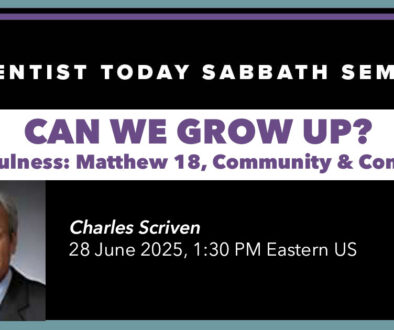Would our pioneers approve of 28 Fundamental Beliefs?
26 September 2022 |
Dear Aunt Sevvy,
Recently someone shared with me this quote from J.N. Loughborough from the October 8, 1861, Review and Herald.
The first step of apostasy is to get up a creed, telling us what we shall believe. The second is, to make that creed a test of fellowship. The third is to try members by that creed. The fourth to denounce as heretics those who do not believe that creed. And fifth, to commence persecution against such.
Does that mean we are going against the pioneers’ intention when we have 28 Fundamental Beliefs?
Signed, Church History Student
Dear Student,
There is a big difference between how an organization operates in its youth, and what it becomes as it grows.
The early Adventists rejected doctrinal lists; they saw themselves as responding to the Holy Spirit’s leading alone. But in 1863, after the group had added quite a few members, they formed themselves into an official denominational organization. Organizations develop assets they must protect: money, property, employees, a name and reputation—and a set of beliefs. The larger our church became, the more it began to value top-down control and conformity above the Spirit’s leading.
Over our almost two centuries of existence, we have evolved from letting the Spirit lead churches and individuals, to placing great authority in the General Conference. Which brings us back to those 28 Fundamental Beliefs, which (even though that wasn’t their original purpose) now function as a way to enforce conformity.
Aunty, though, sees them as the history of how God has led us through the years. She believes that everyone should feel free to follow the Spirit, in the context of their local church, as to which of our beliefs are meaningful in their life. As long as you believe with the first Adventists that our covenant with one another is “to keep the commandments of God, and the faith of Jesus Christ,” that is all you need to be a Seventh-day Adventist.
It is time to return to a church that lets the Holy Spirit speak in more venues than one big meeting. The Holy Spirit also guides in the ministry of countries and regions, as well as in local congregations and schools, and the Spirit should be honored in these local settings, too.
Aunt Sevvy
 You can write to Aunt Sevvy at DearAuntSevvy@gmail.com. Please keep questions or comments short. What you send us at this address won’t necessarily be, but could be, published—without identifying the writer. Aunt Sevvy writes her own column, and her opinions are not necessarily those of Adventist Today’s editors.
You can write to Aunt Sevvy at DearAuntSevvy@gmail.com. Please keep questions or comments short. What you send us at this address won’t necessarily be, but could be, published—without identifying the writer. Aunt Sevvy writes her own column, and her opinions are not necessarily those of Adventist Today’s editors.
To join this conversation, click/tap here.




